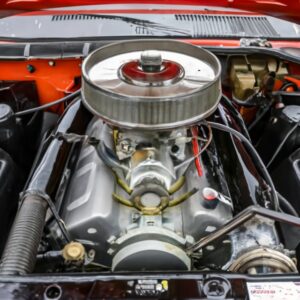Lincoln, a luxury vehicle brand under the Ford Motor Company, has long been associated with elegant design and powerful performance. However, in recent years, a question has been circulating among automotive enthusiasts and Lincoln owners: Are Lincoln engines all subject to water pump destruction? This article aims to delve deep into this issue, exploring the causes, implications, and potential solutions for Lincoln engine water pump problems.
The Role of Water Pumps in Engine Function
Before we dive into the specifics of Lincoln engines, it’s crucial to understand the vital role that water pumps play in any vehicle’s engine system.
What Does a Water Pump Do?
The water pump is a critical component of an engine’s cooling system. Its primary function is to circulate coolant throughout the engine block, cylinder head, and radiator. This circulation helps maintain optimal operating temperatures, preventing the engine from overheating and ensuring efficient performance.
The Importance of a Functioning Water Pump
A properly functioning water pump is essential for:
- Temperature regulation
- Preventing engine damage
- Maintaining fuel efficiency
- Ensuring overall engine longevity
Lincoln Engines: A Brief Overview
Lincoln has utilized various engine types throughout its history, from V6 to V8 configurations. To address the question at hand, we need to examine the specific Lincoln engines that have been associated with water pump issues.
Common Lincoln Engine Types
- 3.5L EcoBoost V6
- 3.7L Ti-VCT V6
- 5.0L Ti-VCT V8
- 3.0L Twin-Turbocharged V6
The Water Pump Dilemma: Fact or Fiction?
Now, let’s address the central question: Are Lincoln engines all subject to water pump destruction? The short answer is no, not all Lincoln engines are inherently prone to water pump failure. However, some models and engine types have shown a higher incidence of water pump-related issues.
Identifying Affected Models
Research and owner reports suggest that certain Lincoln models, particularly those equipped with the 3.5L EcoBoost V6 engine, have experienced higher rates of water pump failures. These models include:
- Lincoln MKS (2010-2016)
- Lincoln MKT (2010-2019)
- Lincoln Continental (2017-2020)
It’s important to note that while these models have reported issues, it doesn’t mean every vehicle will experience water pump destruction.
Causes of Water Pump Failure in Lincoln Engines
To understand why some Lincoln engines might be more susceptible to water pump issues, we need to examine the potential causes of failure.
Design Considerations
Some automotive experts have pointed to the design of certain Lincoln engines as a contributing factor to water pump problems. In particular, the location of the water pump in some EcoBoost engines has been a point of discussion.
Internal vs. External Water Pumps
Many modern engines, including some Lincoln models, use internal water pumps. While this design can offer benefits in terms of compact engine layout, it can also present challenges:
- Difficulty in early detection of leaks
- More complex and costly replacement procedures
- Potential for coolant to contaminate engine oil if the pump fails
Material Quality and Durability
The quality of materials used in water pump construction plays a significant role in its longevity. Some owners and mechanics have speculated that the quality of water pump components in certain Lincoln engines may contribute to premature failure.
Maintenance Factors
While not unique to Lincoln vehicles, maintenance practices can significantly impact water pump lifespan.
The Importance of Coolant Quality and Replacement
One key factor that many experts emphasize is the role of proper coolant maintenance. Regular coolant changes with the correct type and mixture can help prevent corrosion and extend the life of the water pump.
Signs of Water Pump Failure in Lincoln Engines
Recognizing the early signs of water pump issues can help prevent more severe engine damage. Lincoln owners should be aware of the following symptoms:
- Coolant leaks near the front of the engine
- Overheating engine
- Steam from the radiator or hood
- Unusual noises from the front of the engine
- Check engine light or coolant warning light activation
Preventive Measures: Protecting Your Lincoln’s Water Pump
While not all Lincoln engines are destined for water pump failure, taking preventive measures can help ensure the longevity of this critical component.
Regular Maintenance is Key
Adhering to Lincoln’s recommended maintenance schedule is crucial. This includes:
- Regular coolant flushes and replacements
- Inspections of the cooling system
- Timely belt replacements (for externally driven water pumps)
The Coolant Factor: Quality Matters
As mentioned earlier, the quality and type of coolant used can significantly impact water pump lifespan. Lincoln owners should:
- Use manufacturer-recommended coolant types
- Maintain proper coolant mixture ratios
- Avoid mixing different types of coolants
Addressing Early Warning Signs
Being proactive about addressing any signs of cooling system issues can prevent more severe damage. If you notice any of the symptoms mentioned earlier, it’s crucial to have your Lincoln inspected by a qualified mechanic promptly.
Lincoln’s Response to Water Pump Concerns
As reports of water pump issues in certain Lincoln models have surfaced, it’s worth examining how the manufacturer has responded to these concerns.
Technical Service Bulletins (TSBs)
Lincoln has issued Technical Service Bulletins related to water pump issues for some models. These TSBs provide guidance to dealerships and mechanics on addressing specific problems.
Warranty Considerations
For affected vehicles still under warranty, Lincoln has typically covered water pump replacements. However, it’s essential for owners to be aware of their vehicle’s warranty status and any extended coverage options.
The Debate: Are Lincoln Engines Uniquely Vulnerable?
While some Lincoln models have experienced water pump issues, it’s important to put these problems into perspective within the broader automotive landscape.
Comparing Lincoln to Other Luxury Brands
When examining water pump failure rates across luxury vehicle brands, it becomes clear that Lincoln is not alone in facing these challenges. Other manufacturers have also dealt with similar issues in certain engine models.
The Role of Perception and Reporting
It’s worth considering how factors such as brand perception and online reporting can influence the narrative around vehicle reliability. Lincoln’s issues may seem more pronounced due to:
- Increased scrutiny of luxury brands
- Active online communities sharing experiences
- The significant cost of repairs, leading to more discussion
The Future of Lincoln Engines and Water Pump Design
As with any engineering challenge, the automotive industry continually evolves to address known issues. Lincoln and its parent company, Ford, have likely taken steps to improve water pump design and durability in newer engine iterations.
Technological Advancements
Advancements in materials science and engineering are leading to more durable components. Future Lincoln engines may incorporate:
- More robust water pump designs
- Improved sealing technologies
- Enhanced cooling system monitoring capabilities
The Shift Towards Electrification
As Lincoln moves towards electrification, with models like the upcoming Lincoln Corsair Grand Touring PHEV, the nature of engine cooling systems will change. Electric and hybrid powertrains often have different cooling requirements, which may alleviate some of the traditional water pump concerns.
Conclusion: Navigating Lincoln Ownership with Confidence
While the question “Are Lincoln engines all subject to water pump destruction?” has caused concern among some owners and potential buyers, the reality is more nuanced. Not all Lincoln engines are prone to water pump failure, but certain models have shown a higher incidence of issues.
For current and prospective Lincoln owners, the key takeaways are:
- Be aware of your specific model’s history and any reported issues.
- Adhere to recommended maintenance schedules diligently.
- Use high-quality, manufacturer-recommended coolants.
- Address any cooling system concerns promptly.
- Consider extended warranty options for added peace of mind.
By staying informed and proactive, Lincoln owners can enjoy the luxury and performance of their vehicles while minimizing the risk of water pump-related problems.
FAQs: Lincoln Engines and Water Pump Issues
Q: Are all Lincoln models affected by water pump issues?
No, not all Lincoln models are affected. The issue seems more prevalent in certain models, particularly those equipped with the 3.5L EcoBoost V6 engine.
Q: How often should I change the coolant in my Lincoln?
Follow your vehicle’s maintenance schedule, but generally, coolant should be changed every 30,000 to 50,000 miles or every 3-5 years, whichever comes first.
Q: Can I prevent water pump failure in my Lincoln?
While not guaranteed, regular maintenance, using quality coolant, and addressing issues promptly can help prevent water pump failure.
Q: How much does it cost to replace a water pump in a Lincoln?
Costs can vary widely depending on the model and labor rates, but replacements can range from $500 to $2000 or more, especially for internal water pumps.
Q: Are aftermarket water pumps a good option for Lincoln engines?
While aftermarket parts can be less expensive, using OEM (Original Equipment Manufacturer) parts is often recommended to ensure proper fit and function.
Q: How long should a water pump last in a Lincoln engine?
Ideally, a water pump should last 60,000 to 100,000 miles, but this can vary based on driving conditions and maintenance.
Q: What are the first signs of water pump failure in a Lincoln?
Early signs include coolant leaks, overheating, unusual noises from the engine area, and activation of warning lights.
Q: Has Lincoln issued any recalls related to water pump issues?
While Technical Service Bulletins have been issued for some models, there haven’t been widespread recalls specifically for water pump issues.
Q: Can I drive my Lincoln if I suspect water pump problems?
It’s not recommended. Continued driving with a failing water pump can lead to severe engine damage.
Q: Do newer Lincoln models still have water pump concerns?
Lincoln has likely addressed many of the issues in newer models, but it’s always wise to research the specific model year you’re interested in.




